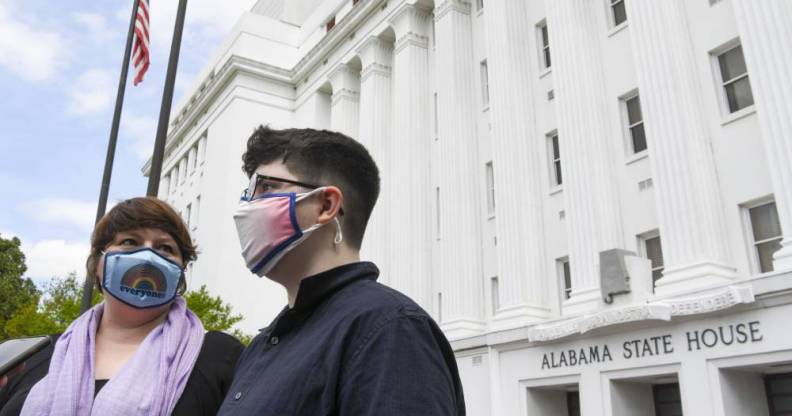Proud mother explains how her son ‘knew he way a boy before he knew what trans meant’ in stirring speech

Trace Trice (L) and her trans son, Phineas Fleming-Smith, speak to the media during a rally at the Alabama State House to draw attention to anti-transgender legislation introduced in Alabama on 30 March 2021 in Montgomery, Alabama. (Photo by Julie Bennett/Getty Images)
A proud mother explained that her trans son “has always been a boy, whether legislators like it or not” in stirring speech about trans rights in Alabama.
Trace Trice of Calhoun County shared with a crowd gathered at the Alabama State House in Montgomery on Tuesday (30 March) stories about her transgender son, Phineas Fleming-Smith. The mum told of how her son loved Star Wars growing up and how he now enjoys Criminal Minds and participating in theatre.
She said that he is now learning to play the guitar and skateboard and likes her “mediocre at best carbonara”. Trice said all of these things meant he was “just like any other Alabama boy”.
Trice joined with other LGBT+ activists at a protest against an Alabama bill that would make it a felony to provide gender-affirming treatment and healthcare to trans youth. The rally and Trice’s speech were livestreamed on the Human Rights Campaign’s YouTube channel.
Trice shared that she knew her child was a “boy before he even knew what trans meant”. She described how Phineas grew up not feeling comfortable in the gender he was assigned at birth, and their struggles in finding gender-affirming healthcare.
Trice said her son was told by doctors that he could not receive hormone treatments before he was 16. She explained, “during that 18-month wait”, Phineas “went through counselling for his gender dysphoria”.
“He went through the process of coming into his own name and his pronouns, and he waited for his parents to get caught up with him on things like clothes and short haircuts,” Trice said.
She added her son waited for “our extended family to accept him” and for his teachers to “be respectful of his transition”.
But she told the crowd that her son has “waited enough” to continue with his medical journey. Trice said his transition “wasn’t a rash decision”, adding the family had “researched and carefully decided on” how Phineas could receive the care he needed.
Trice said: “So when I learned that it might be a possibility that he might have to wait some more based solely on political theatre and a variety of political leaders whose lack of understanding on this issue is only outweighed by their lack of compassion in general, I told him we would do whatever it takes so he doesn’t have to wait any longer.”
She said her son is uncertain about some things – like his plans for college or what he wants for dinner – but she said he is not uncertain about his gender. Trice said: “He was a boy when he told me that he was one morning in the driveway.
“He was a boy whether or not these state legislators like it or not.”
She said that Phineas’ doctor and counsellor all know that he is a boy, and he will still be a boy whether or not the anti-trans bill passes.
“My son deserves to be given the same opportunities for medical care as anyone else,” Trice told the crowd. “He has waited enough.”
In early March, the Alabama Senate passed an anti-trans bill that would prohibit medical professionals from providing critical healthcare and gender-affirming treatment to trans people under the age of 19. This would bar healthcare workers from administering hormone treatments or puberty blockers to trans youth or perform gender-affirming surgeries for trans minors.
If it becomes law, the bill would make it a Class C felony for medical professionals to give gender-affirming care to trans minors, meaning healthcare workers would face a 10-year prison sentence or $15,000 fine.
The bill would also require teachers and school staff in Alabama to alert parents if they learn a student’s “perception that his or her gender is inconsistent with his or her gender”, effectively requiring teachers to ‘out’ trans students to their parents.
Republican senator Shay Shelnutt, who proposed the bill, said it is “wrong” for trans youth to receive gender-affirming care. He argued that children “aren’t mature enough to make these decisions on surgeries and drugs”.
However, Shelnutt has also admitted that he never spoke to a trans youth while preparing the bill, and he wasn’t even aware such treatments were already happening in Alabama when he first introduced the bill last year.

